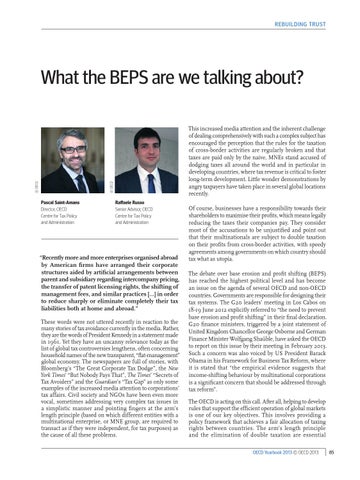REBUILDING TRUST
This increased media attention and the inherent challenge of dealing comprehensively with such a complex subject has encouraged the perception that the rules for the taxation of cross-border activities are regularly broken and that taxes are paid only by the naive. MNEs stand accused of dodging taxes all around the world and in particular in developing countries, where tax revenue is critical to foster long-term development. Little wonder demonstrations by angry taxpayers have taken place in several global locations recently.
© OECD
© OECD
What the BEPS are we talking about?
Pascal Saint-Amans Director, OECD Centre for Tax Policy and Administration
Raffaele Russo Senior Advisor, OECD Centre for Tax Policy and Administration
“Recently more and more enterprises organised abroad by American firms have arranged their corporate structures aided by artificial arrangements between parent and subsidiary regarding intercompany pricing, the transfer of patent licensing rights, the shifting of management fees, and similar practices [...] in order to reduce sharply or eliminate completely their tax liabilities both at home and abroad.” These words were not uttered recently in reaction to the many stories of tax avoidance currently in the media. Rather, they are the words of President Kennedy in a statement made in 1961. Yet they have an uncanny relevance today as the list of global tax controversies lengthens, often concerning household names of the new transparent, “flat-management” global economy. The newspapers are full of stories, with Bloomberg’s “The Great Corporate Tax Dodge”, the New York Times’ “But Nobody Pays That”, The Times’ “Secrets of Tax Avoiders” and the Guardian’s “Tax Gap” as only some examples of the increased media attention to corporations’ tax affairs. Civil society and NGOs have been even more vocal, sometimes addressing very complex tax issues in a simplistic manner and pointing fingers at the arm’s length principle (based on which different entities with a multinational enterprise, or MNE group, are required to transact as if they were independent, for tax purposes) as the cause of all these problems.
Of course, businesses have a responsibility towards their shareholders to maximise their profits, which means legally reducing the taxes their companies pay. They consider most of the accusations to be unjustified and point out that their multinationals are subject to double taxation on their profits from cross-border activities, with speedy agreements among governments on which country should tax what as utopia. The debate over base erosion and profit shifting (BEPS) has reached the highest political level and has become an issue on the agenda of several OECD and non-OECD countries. Governments are responsible for designing their tax systems. The G20 leaders’ meeting in Los Cabos on 18-19 June 2012 explicitly referred to “the need to prevent base erosion and profit shifting” in their final declaration. G20 finance ministers, triggered by a joint statement of United Kingdom Chancellor George Osborne and German Finance Minister Wolfgang Shaüble, have asked the OECD to report on this issue by their meeting in February 2013. Such a concern was also voiced by US President Barack Obama in his Framework for Business Tax Reform, where it is stated that “the empirical evidence suggests that income-shifting behaviour by multinational corporations is a significant concern that should be addressed through tax reform”. The OECD is acting on this call. After all, helping to develop rules that support the efficient operation of global markets is one of our key objectives. This involves providing a policy framework that achieves a fair allocation of taxing rights between countries. The arm’s length principle and the elimination of double taxation are essential OECD Yearbook 2013 © OECD 2013
85
